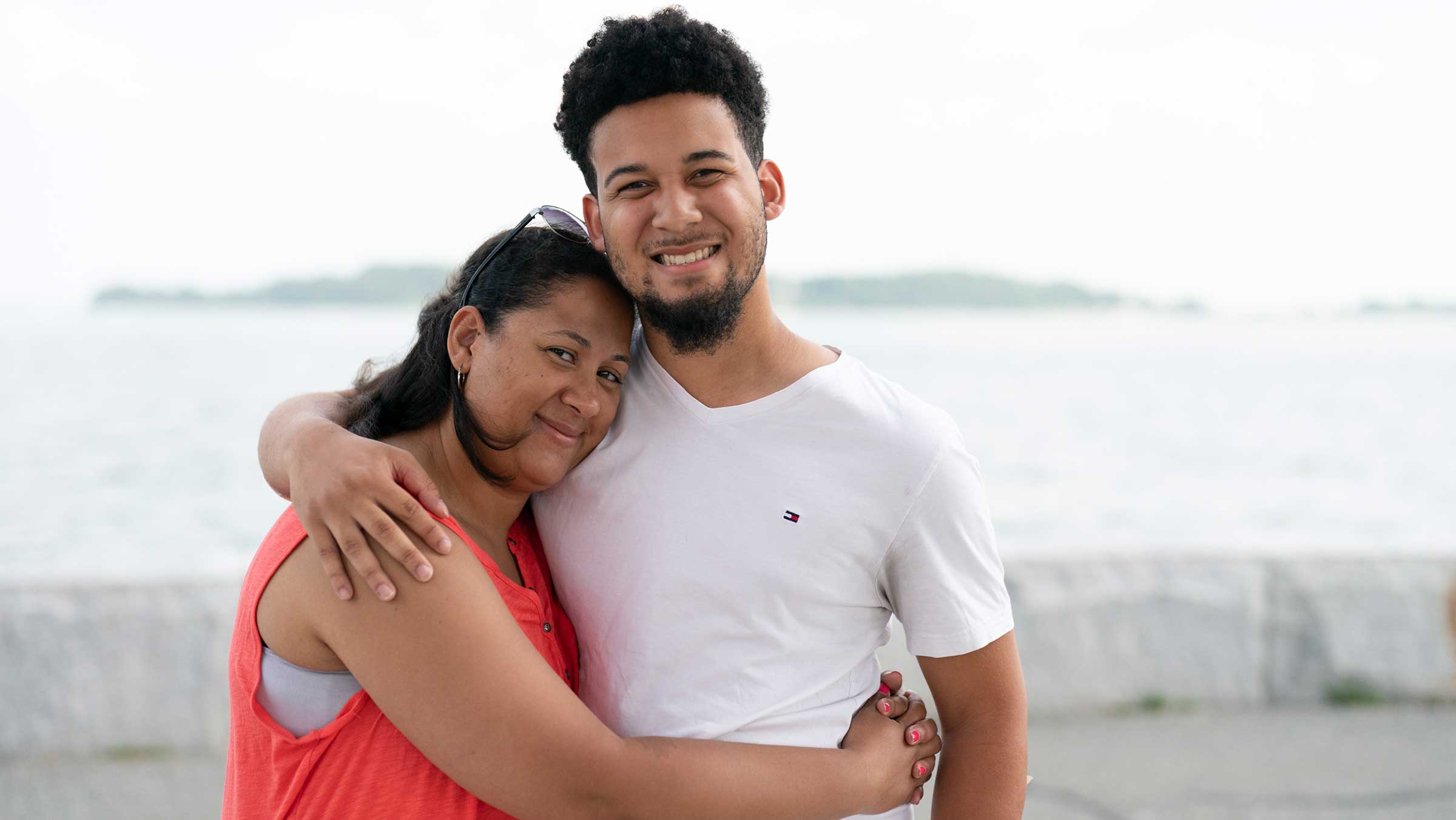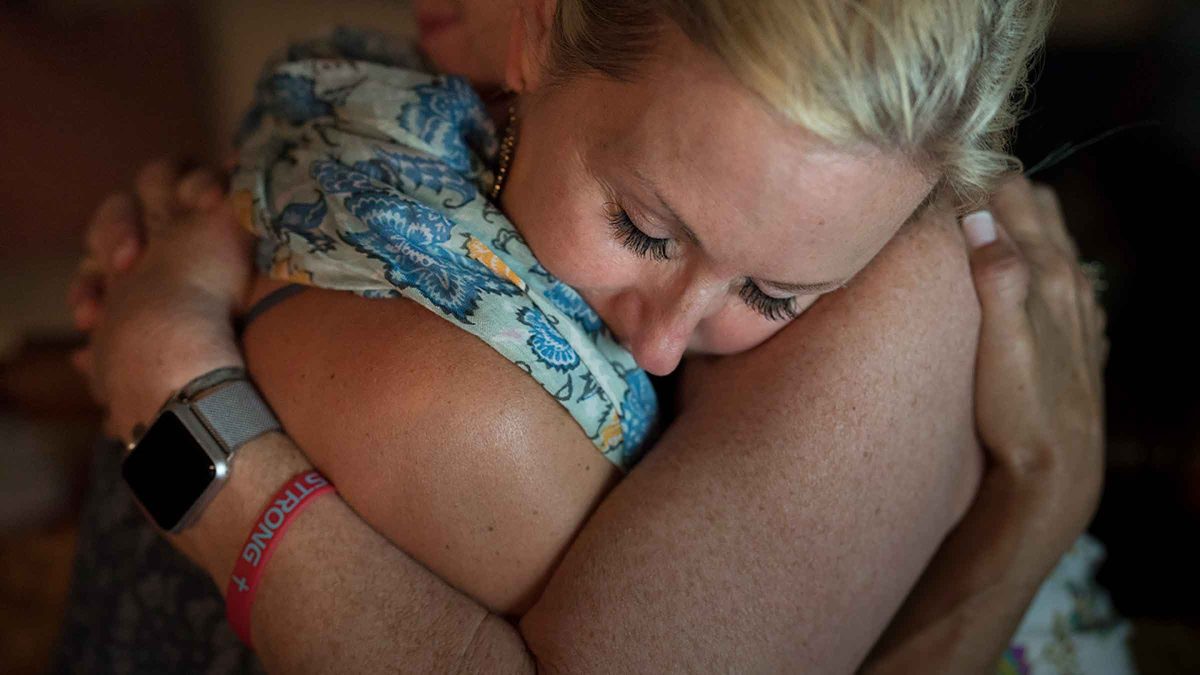How to Navigate Caring for Cancer Patients

CaringBridge Staff | 02.10.23
Pictured above is Courtney Lamb, whose story is part of the CaringBridge How We Heal Series.
While nurses, doctors and medical staff play a critical role in caring for cancer patients, day-to-day care often falls on family members and friends.
Caring for a loved one going through cancer treatment brings its own rewards. But it can also be challenging, especially if you don’t feel prepared. New responsibilities and duties are suddenly added to your daily life as you help your loved one cope with what lies ahead.
Know that these upcoming changes take some time to get used to, and that’s okay. To help you adjust, we’ve collected some tips to help you navigate caring for someone with cancer.
Know That Side Effects Are Real & Should Be Expected
Cancer and treatment bring physical and emotional side effects, which can be different for each patient. Hair loss, chemo brain, nausea, depression and appetite loss are just some of the side effects that can happen.
For some caregivers, witnessing these side effects can be challenging. It’s hard to see your loved one in pain as they work through their journey.
One way to cope is to learn about potential side effects and how you can support your loved one through them. Prepare to make adjustments in your routine, try new remedies and provide additional nurturing. This will help make them as comfortable as possible.
“As a husband and caregiver of my wife who had cancer, chemo brain and fatigue are real, l, so make whatever changes help them and love them [through it]. This is my best advice.”
Wayne R.
Schedule Appointments With a Counselor
Caring for a cancer patient often means you’re watching a friend or family member go through a difficult process. This can bring up challenging emotions in you, too.
If you’re navigating these emotions, know you don’t need to do it all on your own. You deserve support as well. Talking about your experience with a counselor or fellow family caregiver may give you the extra strength you need to keep going.
They can give you a safe space to express your truth, provide you with helpful resources and help you process your emotions. Even if you’re feeling fine now, it may be a worthwhile investment in the long run.
“If you have time, schedule regular appointments with a counselor. They can help guide you through not just finding resources but also taking care of yourself.”
Cecilia V.
Use Your Support Team as a Resource

Remember that your support team is there to help. That includes supporting not just the cancer patient, but also the caregiver. Whether it be a nurse, a counselor or another caregiver, there are many knowledgeable people you can lean on.
Most likely, your support team has worked with patients and caregivers going through a similar cancer situation. You can ask them questions and request resources to help you navigate your unique situation. And don’t forget to have a notebook and pen handy in case you want to write any information down.
“Just sit and talk with different nurses on good and bad days. They are very knowledgeable and inspirational!! Angels in disguise.”
Larry M.
“The best thing that I did when caring for my grandmother was I kept asking her doctors questions. If one of them told my grandmother something about her meds or treatments she didn’t always catch what they said, I made sure to question them about everything regarding her.”
Amber S.
Incorporate Flexibility Into Your Schedule
Whether you’re someone who enjoys routine or likes to plan things out, it’s important to know that caring for a cancer patient requires a degree of flexibility.
Besides doctor’s visits and treatment appointments, there will be other things to take care of. You may have to take on some extra tasks now that you’re caring for someone else, such as helping them bathe or cooking their meals.
With cancer comes a level of uncertainty, as you never know what each day will bring. Your loved one may have good days and bad days, and you’ll have to be ready for the unexpected throughout the journey.
Try to focus on the day ahead and accomplish what you can without too much pressure on yourself. Let others know your situation when necessary, so they don’t expect your normal amount of interaction with them and the world. Try not to stress about your to-do list, and take each day as it comes.
“Take one day and get done what is needed. Plan around the oncologist visits. Have a flexible schedule in case you need to go to plan B. Take a nap if you need one. Read.”
Doreen B.
Have a Confidant to Share Personal Struggles With
It’s important to have a solid support system as you navigate caring for a cancer patient. You’ll be coping with a variety of factors that can be overwhelming at times. You may also deal with fears that bubble to the surface or go through bouts of stress.
Whether you talk to a counselor or a friend, don’t go through this journey alone. Experiencing heavy emotions is normal in this situation, and it’s okay to get support. Express your emotions to someone you trust and who can be there for you as well.
“Have some sort of daily self care even if it’s sitting and breathing for a few minutes. Have a confidant you can share your anxiety, fear, frustration or any other feelings you may have. Find something to laugh at or about every day.”
Sandy A.
Take Breaks and Time Off if Needed

Caregiving is filled with purpose and can be very rewarding. But it’s also an intense, demanding role with many stressors, often leading to mental, emotional and physical exhaustion.
Know that caregiver burnout is a real thing, but you can help prevent it from snowballing by taking time to replenish yourself. This may require getting help from others and spreading out responsibilities, but it’s worth it to get the break you need.
If you’re thinking this sounds impossible for your situation, we understand. As a caregiver, it can feel impossible to take time off. We encourage you to try these resources from Triage Cancer. From self-care habits to taking time off work if possible, you’ll discover some tangible ways to care for yourself.
Remember you’re a human being with your own interests, relationships and hobbies Invest in your well-being whenever you can, whether it’s taking a long bath,going to a movie with a friend, or taking a quick break for short walk in nature.
Know It’s Okay to Ask for Support
Caregivers are hardworking, generous people. They often put their own needs aside to be there for others, not resting until everyone is taken care of. However, this can quickly lead to burnout and feeling overwhelmed.
Remind yourself of this daily if you need to: it’s okay to ask for support. It doesn’t mean you’re not doing a good job. It means you care enough to reach out and receive strength from others, so you can continue caregiving in the best way possible.
If you want an easy way to receive help, consider making a free CaringBridge page.You can post updates on your loved one’s progress and receive words of encouragement from family and friends.
The planner feature allows you to list tasks you need help with, and people can sign up to complete those tasks. From driving your cancer patient to appointments to getting help with grocery shopping, it’s a seamless way to get the support you need.
“Don’t forget to take care of yourself as a caregiver. If someone asks you if you need anything tell them yes. Can you make us a meal? And go from there. It’s ok to ask for help.”
Theresa R.
What’s Your Advice?
Do you have any special words of wisdom to help caregivers care for cancer patients? We welcome your thoughts, insights and personal stories in the comments below. What you share may be just what one caregiver needs to hear to keep moving forward.
Don’t Go Through Your Health Journey Alone
You can stay connected to friends and family, plan and coordinate meals, and experience love from any distance.
All of this is ready for you when you start your personal CaringBridge site, which is completely free of charge, ad-free, private and secure. Don’t spend another minute alone!